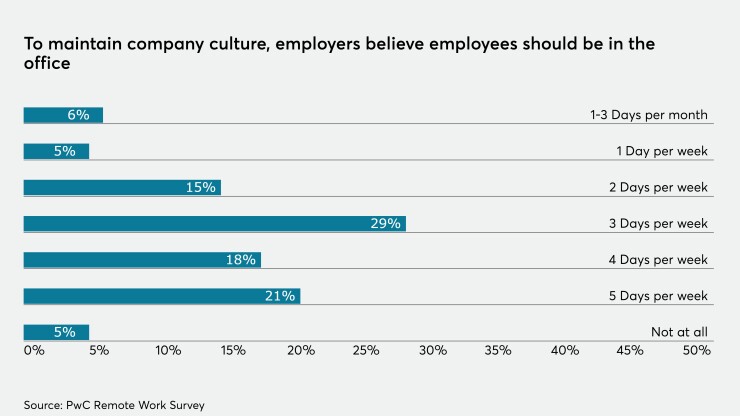With improved testing measures and a nationwide vaccine rollout on the horizon, organizations with workforces that have largely been working remotely are reviewing their plans to return to offices this year. The main question on the minds of business and HR leaders — as well as their employees — is: How, and when, can we safely return to work?
To help employers navigate this new and uncertain time, the U.S. Equal Employment Opportunity Commission recently provided updated guidance in order to help companies abide by the Americans with Disabilities Act in their return to work guidance.
Here are three considerations that employers can and should, keep in mind as they develop return to work policies:
Be transparent with employees at every step of the way
The return to office process will be no less challenging than it was to switch to an entirely remote workforce. During this uncertain time, leadership should make an asserted effort to make employees feel safe and supported — which starts by providing clarity to those who have questions.
Read More:
With this in mind, as companies begin re-opening their office doors, it is critical that employers remain communicative with their employees in a manner that complies with applicable law. While we can all breathe a little easier at the prospect of impending vaccinations, the road to a normalcy may still be many months away. In the interim, employers can help ease employee concerns by distributing regular return to office communications and hosting town halls — which may even help mitigate potential legal hurdles down the road.
Be mindful of disability-related inquiries
When developing return-to-office guidance, some employers may consider offering or even mandating COVID-19 testing either in-house or via a third-party. While the ADA requires, in line with recent EEOC guidance, that any mandatory medical test of employees be “job related and consistent with business necessity,” companies are permitted to take screening steps to determine if employees entering the workplace have COVID-19. Based on current guidance, the EEOC maintains that the ADA will not interfere with employers that wish to follow recommendations by the CDC or other public health authorities regarding whether, when, and for whom testing or other screening is appropriate.
Read More:
However, companies planning to mandate regular COVID-19 testing should be careful about inquiries likely to elicit information about a disability. For example, if an employer requests proof of receipt of a COVID-19 test, additional questions related to this inquiry may elicit information about a disability and be subject to the ADA requirements. As a best practice, the EEOC’s guidance suggests that employers should warn employees to not provide any medical information that may inadvertently implicate ADA standards regarding medical-related inquiries.
Be conscious of compliance with employment laws surrounding mandatory vaccination
In addition to regular testing, employers may also consider asking employees to get the COVID-19 vaccine before returning to the workplace. Before doing so, however, employers should ensure that their vaccination plan complies with various employment laws, such as the ADA, Title VII of the Civil Rights Act (Title VII), and other federal, state, and local laws.
Based on recent guidance published by EEOC, if a COVID-19 vaccination requirement screens out or tends to screen out disabled employees, it could trigger the requirements of the ADA, and employers must demonstrate that an unvaccinated employee would pose a direct threat due to a significant risk of substantial harm to the health or safety of the individual or others that cannot be eliminated or reduced by reasonable accommodation. The EEOC guidance also explains that if an employee holds a sincerely held religious belief, practice, or observance that prevents them from receiving the vaccination, their employer must provide a reasonable accommodation — unless it would pose an “undue hardship” under Title VII.
Read More:
When considering disability or religious accommodations, employers should carefully review and analyze each circumstance on an individualized basis and in consultation with their legal counsel. In doing so, employers can determine how to stay compliant with various federal, state and local employment laws, while establishing a secure workplace for their employees.
As we approach the rest of 2021, optimism around getting back to some normalcy is pervasive. While this is certainly a critical juncture to recognize the progress made thus far, it is also equally important to remember that every new milestone brings its own unique challenges. In the planning to bring workers back to offices, employers and employees alike are entering new territory, which should beget transparency and compassion.






